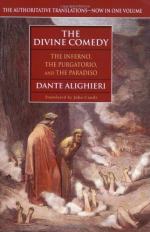E’en as set down by the unerring style
Of thy dear brother, who with thee conspir’d
To bring Rome in unto the way of life,
Faith of things hop’d is substance, and the proof
Of things not seen; and herein doth consist
Methinks its essence,”—“Rightly hast thou deem’d,”
Was answer’d: “if thou well discern, why first
He hath defin’d it, substance, and then proof.”
“The deep things,” I replied, “which
here I scan
Distinctly, are below from mortal eye
So hidden, they have in belief alone
Their being, on which credence hope sublime
Is built; and therefore substance it intends.
And inasmuch as we must needs infer
From such belief our reasoning, all respect
To other view excluded, hence of proof
Th’ intention is deriv’d.”
Forthwith I heard:
“If thus, whate’er by learning men attain,
Were understood, the sophist would want room
To exercise his wit.” So breath’d
the flame
Of love: then added: “Current is the
coin
Thou utter’st, both in weight and in alloy.
But tell me, if thou hast it in thy purse.”
“Even so glittering and so round,” said
I,
“I not a whit misdoubt of its assay.”
Next issued from the deep imbosom’d splendour:
“Say, whence the costly jewel, on the which
Is founded every virtue, came to thee.”
“The flood,” I answer’d, “from
the Spirit of God
Rain’d down upon the ancient bond and new,—
Here is the reas’ning, that convinceth me
So feelingly, each argument beside
Seems blunt and forceless in comparison.”
Then heard I: “Wherefore holdest thou that
each,
The elder proposition and the new,
Which so persuade thee, are the voice of heav’n?”
“The works, that follow’d, evidence their
truth;”
I answer’d: “Nature did not make
for these
The iron hot, or on her anvil mould them.”
“Who voucheth to thee of the works themselves,”
Was the reply, “that they in very deed
Are that they purport? None hath sworn so to
thee.”
“That all the world,” said I, “should
have been turn’d
To Christian, and no miracle been wrought,
Would in itself be such a miracle,
The rest were not an hundredth part so great.
E’en thou wentst forth in poverty and hunger
To set the goodly plant, that from the vine,
It once was, now is grown unsightly bramble.”
That ended, through the high celestial court
Resounded all the spheres. “Praise we
one God!”
In song of most unearthly melody.
And when that Worthy thus, from branch to branch,
Examining, had led me, that we now
Approach’d the topmost bough, he straight resum’d;
“The grace, that holds sweet dalliance with
thy soul,
So far discreetly hath thy lips unclos’d
That, whatsoe’er has past them, I commend.
Behooves thee to express, what thou believ’st,
The next, and whereon thy belief hath grown.”




